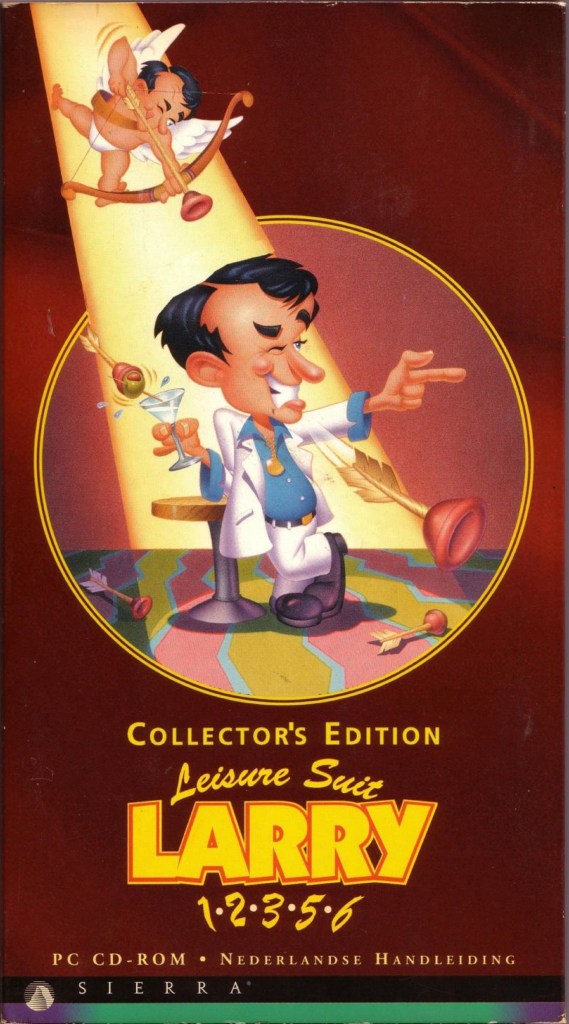Leisure Suit Larry sprang from the womb a combed-over Casanova in white polyester. A court jester with a satyr’s appetites, the misadventures of this horny imp Larry were chronicled in a series of ’80s and ’90s adventure games from Sierra, in which the quest was, always and forever, the desperate, sweaty pursuit of women.
But when this customer from Austria wrote to Sierra in 1989, “we’re rather disturbed by the reports we’ve heard… about Larry,” it was not the sexual content causing concern. Rather, that the game disks themselves had spread a destructive virus bringing financial institutions around the world to the brink of collapse.
Videos by VICE
Servers had shut down on Wall Street. Hard drives were wiped in the banks and trading houses of the City of London. Systems slowed and crashed in Switzerland and West Germany. In the Netherlands, the central government financial administration was deleted entirely. What all these incidents had in common was the presence, on company computers, of pirated copies of Leisure Suit Larry in the Land of the Lounge Lizards.

Much has been written in the past 33 years about video games’ most iconic pervert, but never this: Was Leisure Suit Larry so problematic that it threatened to crash the global economy?
One:
Leisure Suit Larry was always dangerous.
“We’ve had a couple of people come in and say ‘You shouldn’t be selling these,’” said Kathy Hibbard, the assistant manager of a Software, Etc. in the Santa Cruz Capitola Mall. “One lady even turned all the boxes around so you couldn’t see the covers.” In the late ’80s, Larry was part of a whole adult game scene: Strip Poker, Leather Goddesses of Phobos, Sex Vixens from Space and the novelty program MacPlaymate, a proto-Tamagotchi with a submissive female sprite.

“We are taught we are sexual beings for the use of men at their whim. I think these programs are just another way of normalizing that idea,” Jamie Evans of Media Watch, a feminist organization, told the Santa Cruz Sentinel in 1988. “I think they’re all equally dangerous. They represent a feeling in society that women are to be coerced and it’s OK.”
Larry is less explicit than its contemporaries. Sierra pitched Larry as a “humorous, harmless adventure for adults,” and the game is far more concerned with getting laughs than satisfying prurience. It’s not pornography, it’s a nudie pen.
“I said the only way I could do this game is if you’d let me make it a comedy,” remembers Al Lowe, 73, who wrote and designed the Larry series for Sierra. Lowe’s background was pretty wholesome. At Sierra, he’d made Donald Duck’s Playground and Mickey’s Space Adventure, and before that taught high school music. “If you could let me make it funny, and laugh at it, I think I could make it a success,” he told Sierra management. “But I didn’t know how to make a comedy game. There weren’t any comedy games back then. Anything I thought was funny, I threw it in there.”

In Larry, the player guides the hapless title character through hook-ups with sex workers, honey traps and glamorous models in penthouse suites ready to receive intruders, as the game chimes in with lines like “The bed’s a mess, ditto the hooker!”
What made it a comedy rather than just softcore, Lowe thought, was that the game poked fun at Larry and his lifestyle. “How do you take a chauvinistic asshole of a guy and make him likeable? I solved it by making him think he was cool and on top of things, but then to make him lose. The women in the games always came out on top.”
It seemed to work. “I do not feel threatened by ‘Leisure Suit Larry,’” declared Judy Cameron, another employee of the Capitola Software, Etc., in 1988. “He is a lovable ‘nerd’, [in] a hilarious adventure game, written for adults in mind…. Unless our lives turn into what was depicted in the Roger Rabbit movie, we have nothing to fear from Larry.’”

Two:
Larry’s virus spread to executable files on hard and floppy disks. Each time an infected file was run, it would increase in size. Then, on Friday the 13th, the virus would delete infected files, rendering affected applications, if not the entire computer and network, inoperable.
“Friday the 13th [also known as the Jerusalem virus] is probably the most common of all viruses,” a Virus Bulletin reporter wrote in 1989. “I’ve even seen it active on a Dutch hospital database. Nurses used to play an infected copy of Leisure Suit Larry on the patient status registration system. A potentially lethal scenario!” Pirated copies of Larry found at Edwards Air Force Base, and the University of Oldenburg in Germany, and in the personal files of media theorist Freidrich Kittler, were infected.
Who writes a virus, puts it on a pirated copy of Leisure Suit Larry, and what do they gain from setting it loose? There’s no good answer to that, largely because there is no one Jerusalem virus, but an entire family of mutations, mash-ups and variants, all from different sources, and all at play at once. There’s no one author and no one motive.

So mysterious were the virus’ origins that the Israeli software developer Ofer Ahituv worked on a cure to Jerusalem under a cloud of suspicion that he’d made the virus himself. Another anti-virus developer, Yisrael Radai, took a more banal view. The author of the virus, while “very clever,” was “an evidently mentally ill person who wanted to wield power over others and didn’t care how he did it.”
Three:
If the goal of Jerusalem and its variants was to wreak indiscriminate damage and disruption around the world, then Leisure Suit Larry was an ideal carrier.
“That game was highly pirated,” says Al Lowe. “Usually when I meet people and they find out that I wrote Larry, they’ll say ‘Oh, I played that game!’ And my next question to them is always, ‘Did you pay for it?’ And almost always, they’ll say, ‘Uh, I think I paid for some of the later ones.’”
Sierra never advertised the game, and Lowe credits its commercial success and high piracy rate entirely to incredulous word of mouth. “People said, ‘I got this dirty game and you should try it.’” Lowe once demonstrated the game to a room of film executives, who demanded that Lowe make Larry masturbate. “I had no idea if I handled that input or not, but I dutifully typed it in. They started applauding when the answer popped up on screen: ‘The whole idea was to stop doing that, Larry!’”
You can see the appeal, or at least the novelty, in an era where the most titillating things one could do with a computer would be to type ‘penis’ into a DOS prompt, or kiss the mouse. But it’s maybe a tough ask to fork over fifty dollars for a cheeky computer game where the character on the box looks like a porn parody Pinnochio.
Particularly if you need parental permission. “Which means getting hold of it illicitly, and having some kid you know whose parents aren’t paying quite so close attention just make a few copies of those floppies and send them your way. I think Larry lends itself to that in a way that a game like [Sierra’s] King’s Quest might not,” says Jess Morrissette, a professor of political science and long-time Sierra historian—who pirated at least one Larry game, as did this author.
Pirated copies of Leisure Suit Larry were well-circulated, but what really guaranteed an effective spread of the virus was that the game was played at work. “People didn’t have computers at home. Especially a computer that could play our games. Our games required a PC, an IBM compatible PC, and those were mainly business computers,” says Lowe. “We expected people to play them at the office.”

In 1989, the magazine Newsday described a phenomenon of Wall Street brokers and executives caught up in Leisure Suit Larry, with one secretary “admitting” to playing the game for five hours while her boss was out.
“The appeal of having a game like Leisure Suit Larry installed on your work computer is the fact that you know you’re not supposed to play games at work,” says Laine Nooney, Assistant Professor of Media and Information Industries at New York University. “You especially know you’re not supposed to play a game that’s dirty or illicit.”
Something like Larry, or MacPlaymate, “was like the jokes you used to Xerox and pass around,” said one fan of the latter. A computer saleswoman in Los Gatos, California recalled that her male colleagues would “go off and watch [ MacPlaymate] and giggle. You don’t need something like that in a work atmosphere.” In a Silicon Valley office, a group of men playing MacPlaymate hid the computer when a female executive walked in the room.
Four:
Sierra was quick to publicize reports of Larry’s role in the 1988-99 spread of Jerusalem, but there’s not really any evidence that it was a major factor.
“I’d say [it’s] overstated,” says virus and information security specialist Robert Slade. “It was a fairly prevalent myth that viruses spread via pirated commercial software. In fact, I can’t recall many outbreaks spread in that way.”
Indeed, contemporaneous reports of Jerusalem wreaking havoc at British Rail, the Royal National Institute for the Blind, the Glasgow Royal Infirmary, the University of Oklahoma, IBM’s Tampa office, thousands of computers in China, the Chulalongkorn University and two banks in Thailand, the Hebrew University of Jerusalem and the Israeli Defence Force don’t mention Larry at all.
Where Larry was present on an infected system, its salaciousness probably made it a sexier angle than any other pirated software with which it shared hard drive space. “I can imagine… the media [chose to report on] the most provocative of these games, which is Leisure Suit Larry,” says Morrissette. “Not only did a game shut this down, not only did an adult game shut this down, but pirated copies of this adult game, the worst thing of all, feels like it fits a lot of narratives that a lot of key players would want to tell at the time.” I.e.: these sleazy delights have sleazy ends.

“You bastards shouldn’t be stealing!” Lowe remembers thinking. “This was pretty bad [publicity], but on the other hand it encouraged people to buy copies instead of steal them.” The national and international press naming Larry as a virus carrier was the highest-profile coverage and only real marketing that the first Larry game ever received.
Ultimately, the whole episode works almost too much to Sierra’s benefit to be convenient—and a conspiracy-minded brain can run to a scenario like the programmer writing a virus to sell anti-virus software, or Madonna uploading her own songs to LimeWire overdubbed with the message “What the fuck do you think you’re doing?”
Lowe guarantees that nobody at Sierra had anything to do with the virus. “None of us were good enough to do that.” The culprits, he’s pretty sure, were just kids or childlike adults who have nothing better to do than to be malicious, it’s the same kind of people who go around and let the air out of your tires or other mischief. It’s malicious vandalism.”
“Look at all the viruses that are out in the world today,” he says. “I mean the list is endless, and somebody had to write each one of those, and spend hours, it’s like—you know, why? Why do that? You could do something to help people! Or you could make people laugh, there you go! Why not do something that cheers up the world instead?”
Five:
“What motivates me to write viruses is that I just like it.”
In the ’80s and ’90s, virus enthusiasts around the world corresponded with one another on electronic bulletin board systems, sharing code or learning to write viruses from scratch. Many of these documents are now archived on the website textfiles. Scouring textfiles doesn’t produce an answer on the origins of Jerusalem or the corruption of Larry, but does give insight into the worldview responsible for both; a worldview that baffles Al Lowe.
“There is something in certain men that simply drives them to explore the unknown. When standing at the edge of a vast ocean upon which no ship ever sailed, it is difficult not to wonder what lies beyond the horizon just because the rules of the day tell you you’re going to fall of the edge of the world (or they’re going to push you off),” went one manual on virus creation. “Truth seekers and wise men have been persecuted by powerful idiots in every age. Although computer viruses may be very interesting and worthwhile, those who take an interest in them may face some serious challenges from base men.”
Not all viruses were designed for destructive purposes. “I enjoy making the computer do what it isn’t supposed to be able to do,” said one writer. But the writers’ combination of high ability and grandiose self-regard tended to breed contempt.
“Virii are wondrous creations written for the sole purpose of spreading and destroying the systems of unsuspecting fools,” wrote Dark Angel in a guide. “This eliminates the systems of simpletons who can’t tell that there is a problem when a 100 byte file suddenly blossoms into a 1,000 byte file. Duh. These low-lifes do not deserve to exist, so it is our sacred duty to wipe their hard drives off the face of the Earth.”
There’s bitter and angry undercurrents to these messages but also incredible sadness. “All throughout my life I have been involved with the negative side of my pastimes. For instance, when I was younger I was an heavily into art, but instead of doing my work on a canvas with oils – I did it on a wall with spray paint,” explained someone called Hellraiser. “Naturally when it came to computers I once again found myself on the ‘dark side’… I find it much easier to accomplish negative actions, than positive – thus my drive for writing viruses… [my mother] has been though a lot of strife over the years, a large portion of which is my fault. Yet she still stays happy and positive. I could never be that way.”
Six:
Leisure Suit Larry was never dangerous.
The games’ interest in sex and vice extends only to double entendres and tortured jokes. (“You’re a ‘software’ kind of guy and I’m a ‘hardware’ kind of girl. How about if I ‘download onto your hard disk?’ “I notice you have something called a ‘turn down service.’ Is this something I need to request? Usually I have no trouble getting turned down.”) The first games in the series with digital audio encourage the player to fool around with burp, fart and toilet sound effects, which are found in a section of the menu called “Keyboard Fun.”

When it comes to sex, Larry is sheepish, if not terrified. As a player, you are reminded that sex is about “pleasing your heart, not just your other organs,” and that Larry’s out there not just for sex, but marriage. In the second game, reciprocating any sexual overture leads to death. Larry is never a stud but a dog forever chasing a car.
True Sierra heads know that Gabriel Knight was always the horny one in the family. Post-Sierra, Gabriel Knight designer Jane Jensen went on to write erotic fiction, while Al Lowe started a website with information on the best ways to back up a hard drive and a mailing list of corny jokes. (“A woman called the local paper to place her husband’s obituary notice after she caught him cheating on her with his secretary. The editor asked, ‘And how long has your husband been dead?’ She answered, ‘He starts tomorrow!’” Seventy-seven users rated this joke 2.8 out of 5.)
“I never did go out to bars much. The only time I went to bars is when they paid me to. I just never think about going someplace and drinking or trying to pick up girls,” said Lowe. In a more recent interview: “If you’ve played Larry, you know me. You can’t hide that much. There’s not that much left of me that I haven’t shared with you already if you’ve gone through all those games. That’s the kinda guy I am. I’m not pornographic. I’m not sick… I’ve got a streak of naughtiness in me and I like to laugh a lot, and that comes through in my games.”

There’s plenty to object to in Larry. The series’ treatment of gender, queerness, and race is rough throughout (gay men are mincing and predatory; women are “Amazon lesbian cannibals”) and it betrays a particular cruel streak when depicting “dumb” women. But all this, though offensive, wasn’t supposed to be mean. It’s all meant as a joke. Any truly “obscene, sick, weird, racist” humor, Lowe disavows. Larry is just old-fashioned. Larry is corny. Larry is a boomer.
It’s quaint, for a lot of reasons, to think that Leisure Suit Larry was ever considered truly dangerous; that its lewdness and immorality represented the worst of computers. It had to be twisted into a threat, by disaffected young men idly worsening the world out of malevolence or indifference. That casual malevolence is of a different generation than Al Lowe and Leisure Suit Larry, but it shares a thing in common. It loves to laugh. But it doesn’t like jokes about ex-wives and lawyers. It likes to hurt people.
Al Lowe is 73 years old. Al Lowe does not get it.
More
From VICE
-

Screenshot: Devolver Digital -

Screenshot: Xbox Game Studios -

Screenshot: Raccoon Logic Studios Inc. -

Screenshot: Matt Vatankhah
